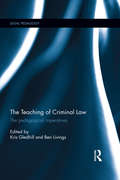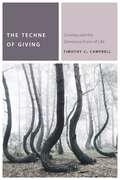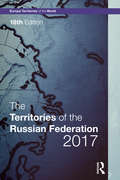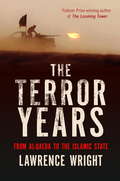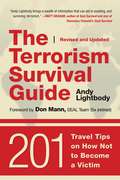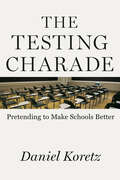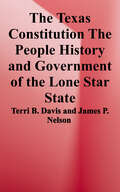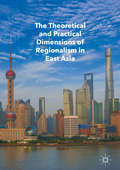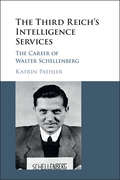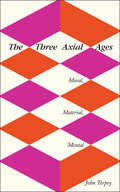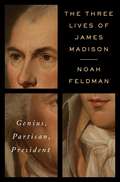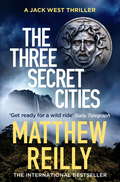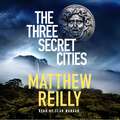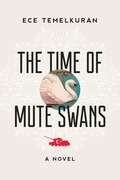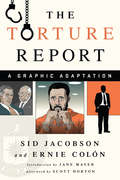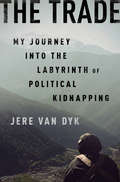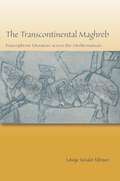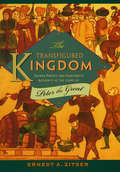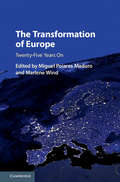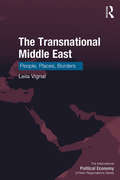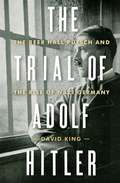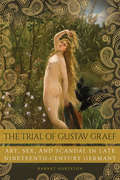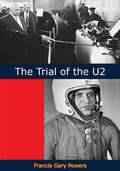- Table View
- List View
The Teaching of Criminal Law: The pedagogical imperatives (Legal Pedagogy)
by Kris Gledhill Ben LivingsThe Teaching of Criminal Law provides the first considered discussion of the pedagogy that should inform the teaching of criminal law. It originates from a survey of criminal law courses in different parts of the English-speaking world which showed significant similarity across countries and over time. It also showed that many aspects of substantive law are neglected. This prompted the question of whether any real consideration had been given to criminal law course design. This book seeks to provide a critical mass of thought on how to secure an understanding of substantive criminal law, by examining the course content that best illustrates the thought process of a criminal lawyer, by presenting innovative approaches for securing active learning by students, and by demonstrating how criminal law can secure other worthwhile graduate attributes by introducing wider contexts. This edited collection brings together contributions from academic teachers of criminal law from Australia, New Zealand, the United Kingdom, and Ireland who have considered issues of course design and often implemented them. Together, they examine several innovative approaches to the teaching of criminal law that have been adopted in a number of law schools around the world, both in teaching methodology and substantive content. The authors offer numerous suggestions for the design of a criminal law course that will ensure students gain useful insights into criminal law and its role in society. This book helps fill the gap in research into criminal law pedagogy and demonstrates that there are alternative ways of delivering this core part of the law degree. As such, this book will be of key interest to researchers, academics and lecturers in the fields of criminal law, pedagogy and teaching methods.
The Teaching of Criminal Law: The pedagogical imperatives (Legal Pedagogy)
by Kris Gledhill Ben LivingsThe Teaching of Criminal Law provides the first considered discussion of the pedagogy that should inform the teaching of criminal law. It originates from a survey of criminal law courses in different parts of the English-speaking world which showed significant similarity across countries and over time. It also showed that many aspects of substantive law are neglected. This prompted the question of whether any real consideration had been given to criminal law course design. This book seeks to provide a critical mass of thought on how to secure an understanding of substantive criminal law, by examining the course content that best illustrates the thought process of a criminal lawyer, by presenting innovative approaches for securing active learning by students, and by demonstrating how criminal law can secure other worthwhile graduate attributes by introducing wider contexts. This edited collection brings together contributions from academic teachers of criminal law from Australia, New Zealand, the United Kingdom, and Ireland who have considered issues of course design and often implemented them. Together, they examine several innovative approaches to the teaching of criminal law that have been adopted in a number of law schools around the world, both in teaching methodology and substantive content. The authors offer numerous suggestions for the design of a criminal law course that will ensure students gain useful insights into criminal law and its role in society.This book helps fill the gap in research into criminal law pedagogy and demonstrates that there are alternative ways of delivering this core part of the law degree. As such, this book will be of key interest to researchers, academics and lecturers in the fields of criminal law, pedagogy and teaching methods.
The Techne of Giving: Cinema and the Generous Form of Life (Commonalities)
by Timothy C. CampbellOver the last five years, corporations and individuals have given more money, more often, to charitable organizations than ever before. What could possibly be the downside to inhabiting a golden age of gift-giving? That question lies at the heart of Timothy Campbell’s account of contemporary giving and its social forms. In a milieu where gift-giving dominates, nearly everything given and received becomes the subject of a calculus—gifts from God, from benefactors, from those who have. Is there another way to conceive of generosity? What would giving and receiving without gifts look like?A lucid and imaginative intervention in both European philosophy and film theory, The Techne of Giving investigates how we hold the objects of daily life—indeed, how we hold ourselves—in relation to neoliberal forms of gift-giving. Even as instrumentalism permeates giving, Campbell articulates a resistant techne locatable in forms of generosity that fail to coincide with biopower’s assertion that the only gifts that count are those given and received. Moving between visual studies, Winnicottian psychoanalysis, Foucauldian biopower, and apparatus theory, Campbell makes a case for how to give and receive without giving gifts. In the conversation between political philosophy and classic Italian films by Visconti, Rossellini, and Antonioni, the potential emerges of a generous form of life that can cross between the visible and invisible, the fated and the free.
The Telegraph India [Mon, 27 Nov 2017]
by R. RajgopalArticles in this issue: Home India Calcutta World Opinion Business Sports West Bengal North East Jharkhand Bihar Odisha Entertainment Lifestyle Science Technology Travel Health Auto
The Territories of the Russian Federation 2017
by 18th EditionThis excellent reference source brings together hard-to-find information on the constituent units of the Russian Federation. The introduction examines the Russian Federation as a whole, followed by a chronology, demographic and economic statistics, and a review of the Federal Government. The second section comprises territorial surveys, each of which includes a current map. This edition includes surveys covering the annexed (and disputed) territories of Crimea and Sevastopol, as well as updated surveys of each of the other 83 federal subjects. The third section comprises a select bibliography of books. The fourth section features a series of indexes, listing the territories alphabetically, by Federal Okrug and Economic Area. Users will also find a gazetteer of selected alternative and historic names, a list of the territories abolished, created or reconstituted in the post-Soviet period, and an index of more than 100 principal cities, detailing the territory in which each is located.
The Terror Years: From al-Qaeda to the Islamic State
by Lawrence WrightTen powerful pieces first published in The New Yorker recall the path terror in the Middle East has taken from the rise of al-Qaeda in the 1990s to the recent beheadings of reporters and aid workers by ISIS. With the Pulitzer Prize-winning The Looming Tower, Lawrence Wright became generally acknowledged as one of our major journalists writing on terrorism in the Middle East. This collection draws on several articles he wrote while researching that book as well as many that he's written since, following where and how al-Qaeda and its core cult-like beliefs have morphed and spread. They include an indelible impression of Saudi Arabia, a kingdom of silence under the control of the religious police; the Syrian film industry, then compliant at the edges but already exuding a feeling of the barely masked fury that erupted into civil war; the 2006-11 Israeli-Palestinian conflict in Gaza, a study in disparate values of human lives. Others continue to look into al-Qaeda as it forms a master plan for its future, experiences a rebellion from within the organization, and spins off a growing web of terror in the world. The American response is covered in profiles of two FBI agents and a chief of the CIA. It ends with the recent devastating piece about the capture and beheading by ISIS of four American journalists and aid workers, and how the US government failed to handle the situation.
The Terrorism Survival Guide: 201 Travel Tips on How Not to Become a Victim, Revised and Updated
by Andy LightbodyThe age of carefree travel is over. The threats of criminal acts and of terrorism, both internationally and domestically, are an all-too-common reality. Last year saw more than fourteen thousand terrorist incidents across the globe—it’s no wonder that people are frightened when they are away from home.The Terrorism Survival Guide: 201 Travel Tips on How Not to Become a Victim can help take away that fear. The book is an easy-to read pocket guide with hundreds of tips that help take away the worry of business and vacation travels. These tips are designed for everyone and cover a wide range of topics:Staying safe at airportsHow to protect your luggage“Low profile” tourismTraveling with childrenWhat to do if capturedIn addition to travel tips, the book gives contact information for US embassies and consulates worldwide, US Customs information, State Department terrorism updates, and TSA guidelines. The Terrorism Survival Guide will make you a wiser, smarter, and safer traveler.
The Testing Charade: Pretending to Make Schools Better
by Daniel KoretzFor decades we’ve been studying, experimenting with, and wrangling over different approaches to improving public education, and there’s still little consensus on what works, and what to do. The one thing people seem to agree on, however, is that schools need to be held accountable—we need to know whether what they’re doing is actually working. But what does that mean in practice? High-stakes tests. Lots of them. And that has become a major problem. Daniel Koretz, one of the nation’s foremost experts on educational testing, argues in The Testing Charade that the whole idea of test-based accountability has failed—it has increasingly become an end in itself, harming students and corrupting the very ideals of teaching. In this powerful polemic, built on unimpeachable evidence and rooted in decades of experience with educational testing, Koretz calls out high-stakes testing as a sham, a false idol that is ripe for manipulation and shows little evidence of leading to educational improvement. Rather than setting up incentives to divert instructional time to pointless test prep, he argues, we need to measure what matters, and measure it in multiple ways—not just via standardized tests. Right now, we’re lying to ourselves about whether our children are learning. And the longer we accept that lie, the more damage we do. It’s time to end our blind reliance on high-stakes tests. With The Testing Charade, Daniel Koretz insists that we face the facts and change course, and he gives us a blueprint for doing better.
The Texas Constitution: The People, History, and Government of the Lone Star State
by Terri B. Davis James P. NelsonThis is a book written for university political science classes. It focuses on the Texas constitution, its history, and how it functions in Texas politics. It discusses the constitution's context in American federalism and the role of elections, political parties, and interest groups in the state and gives much attention to the three branches of Texas government created by the Texas Constitution of 1876. <p><p>The book provides foundations for understanding the current Texas Constitution and some of the unique features of Texas government. Historically, the Constitution was written in response to the state's experience with Reconstruction and the governorship of Edmund Davis, and a political culture that embraced and continues to embrace rugged individualism and a strong belief in limited government. Today, the legislative, executive, and judicial branches of Texas government retain the basic structures created for them by the Constitution of 1876, as well as additional features added through constitutional amendments and state statutes.
The Theoretical and Practical Dimensions of Regionalism in East Asia
by Karolina Klecha-TylecThis book provides a comprehensive overview of developments in East Asian regionalism, combining qualitative evidence with empirical quantitative analysis. It argues that two dominant processes have formed East Asian regionalism: 1) regionalization, and 2) inter-regionalism. Klecha-Tylec examines the differences between traditional and new regionalisms as they apply to East Asia; the differences between East Asian and European regionalism; the role of the United States in shaping regional links; and the evolution of the three key structures of ASEAN, ASEAN+3, and Asia Summits. The book is unique for examining together the network, zonal, and geospatial dimensions of relations in East Asia as they apply at micro-regional, sub-regional, macro-regional, trans-regional and inter-regional levels. The book offers a detailed analysis of intra-regional links and the hybrid relationships between micro-regions and nation-states.
The Third Reich's Intelligence Services
by Katrin PaehlerThis is the first-ever analytical study of Nazi Germany's political foreign intelligence service, Office VI of the Reichssicherheitshauptamt and its head, Walter Schellenberg. Katrin Paehler tells the story of Schellenberg's career in policing and intelligence, charts the development and activities of the service he eventually headed, and discusses his attempts to place it at the center of Nazi foreign intelligence and foreign policy. The book locates the service in its proper pedigree of the SS as well as in relation to its two main rivals - the Abwehr and the Ausw#65533;rtige Amt. It also considers the role Nazi ideology played in the conceptualization and execution of foreign intelligence, revealing how this ideological prism fractured and distorted Office VI's view of the world. The book is based on contemporary and postwar documents - many recently declassified - from archives in the United States, Germany, and Russia.
The Three Axial Ages: Moral, Material, Mental
by John TorpeyHow should we think about the “shape” of human history since the birth of cities, and where are we headed? Sociologist and historian John Torpey proposes that the “Axial Age” of the first millennium BCE, when some of the world’s major religious and intellectual developments first emerged, was only one of three such decisive periods that can be used to directly affect present social problems, from economic inequality to ecological destruction. Torpey’s argument advances the idea that there are in fact three “Axial Ages,” instead of one original Axial Age and several subsequent, smaller developments. Each of the three ages contributed decisively to how humanity lives, and the difficulties it faces. The earliest, or original, Axial Age was a moral one; the second was material, and revolved around the creation and use of physical objects; and the third is chiefly mental, and focused on the technological. While there are profound risks and challenges, Torpey shows how a worldview that combines the strengths of all three ages has the potential to usher in a period of exceptional human freedom and possibility.
The Three Lives of James Madison: Genius, Partisan, President
by Noah FeldmanA sweeping reexamination of the Founding Father who transformed the United States in each of his political “lives”—as a revolutionary thinker, as a partisan political strategist, and as a president“In order to understand America and its Constitution, it is necessary to understand James Madison.”—Walter Isaacson, #1 New York Times bestselling author of Leonardo da Vinci Over the course of his life, James Madison changed the United States three times: First, he designed the Constitution, led the struggle for its adoption and ratification, then drafted the Bill of Rights. As an older, cannier politician he co-founded the original Republican party, setting the course of American political partisanship. Finally, having pioneered a foreign policy based on economic sanctions, he took the United States into a high-risk conflict, becoming the first wartime president and, despite the odds, winning. In The Three Lives of James Madison, Noah Feldman offers an intriguing portrait of this elusive genius and the constitutional republic he created—and how both evolved to meet unforeseen challenges. Madison hoped to eradicate partisanship yet found himself giving voice to, and institutionalizing, the political divide. Madison’s lifelong loyalty to Thomas Jefferson led to an irrevocable break with George Washington, hero of the American Revolution. Madison closely collaborated with Alexander Hamilton on the Federalist papers—yet their different visions for the United States left them enemies. Alliances defined Madison, too. The vivacious Dolley Madison used her social and political talents to win her husband new supporters in Washington—and define the diplomatic customs of the capital’s society. Madison’s relationship with James Monroe, a mixture of friendship and rivalry, shaped his presidency and the outcome of the War of 1812. We may be more familiar with other Founding Fathers, but the United States today is in many ways Madisonian in nature. Madison predicted that foreign threats would justify the curtailment of civil liberties. He feared economic inequality and the power of financial markets over politics, believing that government by the people demanded resistance to wealth. Madison was the first Founding Father to recognize the importance of public opinion, and the first to understand that the media could function as a safeguard to liberty. The Three Lives of James Madison is an illuminating biography of the man whose creativity and tenacity gave us America’s distinctive form of government. His collaborations, struggles, and contradictions define the United States to this day.
The Three Secret Cities (Jack West Series)
by Matthew ReillyJoin one of the world's greatest adventure writers on a non-stop thrill-ride. * * * * *A SHADOW WORLD BEHIND THE REAL WORLDWhen Jack West Jr won the Great Games, he threw the four legendary kingdoms into turmoil.A WORLD WITH ITS OWN HISTORY, RULES AND PRISONSNow these dark forces are coming after Jack... in ruthless fashion.THAT IS REACHING INTO OUR WORLD ... EXPLOSIVELYWith the end of all things rapidly approaching, Jack must find the Three Secret Cities, three incredible lost cities of legend.It's an impossible task by any reckoning, but Jack must do it while he is being hunted... * * * * *JACK'S BACK. Catch up with him in the rest of the international bestselling series.SEVEN ANCIENT WONDERSTHE SIX SACRED STONESTHE FIVE GREATEST WARRIORSTHE FOUR LEGENDARY KINGDOMS
The Three Secret Cities: ‘The hottest action writer around’ Evening Telegraph (Jack West Series)
by Matthew ReillyJoin one of the world's greatest adventure writers on a non-stop thrill-ride. * * * * *A SHADOW WORLD BEHIND THE REAL WORLDWhen Jack West Jr won the Great Games, he threw the four legendary kingdoms into turmoil.A WORLD WITH ITS OWN HISTORY, RULES AND PRISONSNow these dark forces are coming after Jack... in ruthless fashion.THAT IS REACHING INTO OUR WORLD ... EXPLOSIVELYWith the end of all things rapidly approaching, Jack must find the Three Secret Cities, three incredible lost cities of legend.It's an impossible task by any reckoning, but Jack must do it while he is being hunted... * * * * *JACK'S BACK. Catch up with him in the rest of the international bestselling series.SEVEN ANCIENT WONDERSTHE SIX SACRED STONESTHE FIVE GREATEST WARRIORSTHE FOUR LEGENDARY KINGDOMS
The Time of Mute Swans: A Novel
by Ece TemelkuranAnkara, the capital city in the heart of Turkey at the crossroads of Europe and Asia, East and West, is a hotspot in the Cold War, torn between communism and conservatism, Western freedoms and traditional ways, with an army fearful of democracy and a government that employs thugs and torture to enforce law and order. In the summer of 1980, tensions are building. Homes of the poor are being burnt down. Armed revolutionaries on college campuses battle right-wings militias in the city's neighborhoods. The lines between good and bad, right and wrong, and beautiful and ugly are blurred by shed blood. Two children, one from a family living in misery and one well-off, form an alliance amid the turmoil. Through their senses, the cityscape unfolds its wonders, its rich smells and colors, as they try to make sense of the events swirling around them. And they hatch a plan. For the first time in generations, mute swans have migrated from Russia to the Black Sea and to a park at the center of Ankara. For the generals, they are an affirmation, and their wings must be broken so they can't fly away. But if the children can save one swan, won't they have saved the freedom of all?
The Torture Report: A Graphic Adaptation
by Jane Mayer Sid Jacobson Scott Horton"The more who learn the truth the better off the country will be, because there is no better safeguard against the revival of torture than a well-informed public." --Jane Mayer, from the IntroductionOn December 9, 2014, the Senate Select Committee on Intelligence released a report that strongly condemned the CIA for its secret and brutal use of torture in the treatment of prisoners captured in the "war on terror" during the George W. Bush administration. This deeply researched and fully documented investigation caused monumental controversy, interest, and concern, and starkly highlighted both how ineffective the program was as well as the lengths to which the CIA had gone to conceal it.In The Torture Report, Sid Jacobson and Ernie Colón use their celebrated graphic-storytelling abilities to make the damning torture report accessible, finally allowing Americans to lift the veil and fully understand the crimes committed by the CIA.
The Trade: My Journey into the Labyrinth of Political Kidnapping
by Jere Van Dykn 2014, Jere Van Dyk traveled to Afghanistan to try to discover the motives behind a kidnapping that had occurred six years earlier--his own. He was haunted by questions about why he was taken and why he was released, and troubled by the refusal of his friends, employer, and government employees to offer him a full account of what they knew. An experienced investigative reporter, he began a quest to interrogate the accuracy of everything he was told, including from the people he trusted most.In pursuing his kidnappers, and the stories of the intermediaries and money men, Van Dyk uncovered not just the story of his own abduction but the operation of what he calls the Trade: the business of kidnapping. Operating according to its own shadowy rules, the Trade has become a murky form of negotiation between criminal groups, corporations, families, and governments who have no formal lines of communication.Van Dyk's journey took him from up near the Tribal Areas of Pakistan, to the tea shops of Kabul, to the Obama White House, and revealed evidence of lucrative transactions and rival bandit groups working under the direction of intelligence services. In its course, he met the families of many Americans who were or are still kidnapped, bargaining chips at the mercy of violent and pitiless extremists who thrive in the world's most lawless spaces.
The Transcontinental Maghreb: Francophone Literature across the Mediterranean
by Edwige Tamalet TalbayevThe writer Gabriel Audisio once called the Mediterranean a “liquid continent.” Taking up the challenge issued by Audisio’s phrase, Edwige Tamalet Talbayev insists that we understand the region on both sides of the Mediterranean through a “transcontinental” heuristic. Rather than merely read the Maghreb in the context of its European colonizers from across the Mediterranean, Talbayev compellingly argues for a transmaritime deployment of the Maghreb across the multiple Mediterranean sites to which it has been materially and culturally bound for millennia.The Transcontinental Maghreb reveals these Mediterranean imaginaries to intersect with Maghrebi claims to an inclusive, democratic national ideal yet to be realized. Through a sustained reflection on allegory and critical melancholia, the book shows how the Mediterranean decenters postcolonial nation-building projects and mediates the nomadic subject’s reinsertion into a national collective respectful of heterogeneity. In engaging the space of the sea, the hybridity it produces, and the way it has shaped such historical dynamics as globalization, imperialism, decolonization, and nationalism, the book rethinks the very nature of postcolonial histories and identities along its shores.
The Transfigured Kingdom: Sacred Parody and Charismatic Authority at the Court of Peter the Great (Studies of the Harriman Institute)
by Ernest A. ZitserIn this richly comparative analysis of late Muscovite and early Imperial court culture, Ernest A. Zitser provides a corrective to the secular bias of the scholarly literature about the reforms of Peter the Great. Zitser demonstrates that the tsar's supposedly "secularizing" reforms rested on a fundamentally religious conception of his personal political mission. In particular, Zitser shows that the carnivalesque (and often obscene) activities of the so-called Most Comical All-Drunken Council served as a type of Baroque political sacrament—a monarchical rite of power that elevated the tsar's person above normal men, guaranteed his prerogative over church affairs, and bound the participants into a community of believers in his God-given authority ("charisma"). The author suggests that by implicating Peter's "royal priesthood" in taboo-breaking, libertine ceremonies, the organizers of such "sacred parodies" inducted select members of the Russian political elite into a new system of distinctions between nobility and baseness, sacrality and profanity, tradition and modernity.Tracing the ways in which the tsar and his courtiers appropriated aspects of Muscovite and European traditions to suit their needs and aspirations, The Transfigured Kingdom offers one of the first discussions of the gendered nature of political power at the court of Russia's self-proclaimed "Father of the Fatherland" and reveals the role of symbolism, myth, and ritual in shaping political order in early modern Europe.
The Transformation of Europe: Twenty-Five Years On
by Miguel Maduro Marlene WindJoseph Weiler's The Transformation of Europe is one of the most influential works in the history of European studies. Twenty-five years after its original publication, this new collection of essays pays tribute to Weiler's legacy by discussing some of the most pressing issues in contemporary European Union law, policy and constitutionalism. The book does not intend to be a simple expression of intellectual esteem for Weiler's seminal work; instead, the collection honours it by critically engaging with some of its assumptions and theses. Overall, it shows how a study of 1991 can still be fundamental to the present and future of the EU, including the challenges of Brexit and Eurozone crises.
The Transnational Middle East: People, Places, Borders (New Regionalisms Series)
by Leïla VignalThe Middle East has been undergoing new crises since the powerful socio-political uprisings known as the Arab Spring took place in several countries in 2011. Some countries are experiencing a long-term collapse of their political and social structures out of internal conflicts and external interventions. The Transnational Middle East posits that, in the Middle East, the development of regional dynamics, of processes and circulations of all kinds, can be documented. In this regard, the approaches it develops — ‘bottom-up’ regionalisation, ‘globalisation from below’ — allow for a better understanding of the ways in which the Middle East is part of global transformations. The book analyses how, through their practices, Middle East societies elaborate a regional space which is not institutionalised. Based on fieldwork in the Middle East, the book provides venues for further theoretical elaboration on globalisation and contemporary societies, as well as on processes of regionalisation. It draws on the emergence of genuine regional spaces of culture, art, economic activity, human circulation — which supplement and do not contradict other infra-national, national, or global social processes. As in other areas of the world, these transformations are to a large extent the mode of the Middle East’s insertion into globalisation. In this respect, they go against standard narratives of the supposed ‘exceptionalism’ of the region. This book will be a great contribution to comparative politics, Middle Eastern studies, globalisation and international relations.
The Trial of Adolf Hitler: The Beer Hall Putsch and the Rise of Nazi Germany
by David KingOn the evening of November 8, 1923, the thirty-four-year-old Adolf Hitler stormed into a beer hall in Munich, fired his pistol in the air, and proclaimed a revolution. Seventeen hours later, all that remained of his bold move was a trail of destruction. Hitler was on the run from the police. His career seemed to be over. The Trial of Adolf Hitler tells the true story of the monumental criminal proceeding that followed when Hitler and nine other suspects were charged with high treason. Reporters from as far away as Argentina and Australia flocked to Munich for the sensational four-week spectacle. By its end, Hitler would transform the fiasco of the beer hall putsch into a stunning victory for the fledgling Nazi Party. It was this trial that thrust Hitler into the limelight, provided him with an unprecedented stage for his demagoguery, and set him on his improbable path to power. Based on trial transcripts, police files, and many other new sources, including some five hundred documents recently discovered from the Landsberg Prison record office, The Trial of Adolf Hitler is a gripping true story of crime and punishment--and a haunting failure of justice with catastrophic consequences.
The Trial of Gustav Graef: Art, Sex, and Scandal in Late Nineteenth-Century Germany
by Barnet HartstonAlthough largely forgotten now, the 1885 trial of German artist Gustav Graef was a seminal event for those who observed it. Graef, a celebrated sixty-four-year-old portraitist, was accused of perjury and sexual impropriety with underage models. On trial alongside him was one of his former models, the twenty-one-year-old Bertha Rother, who quickly became a central figure in the affair. As the case was being heard, images of Rother, including photographic reproductions of Graef's nude paintings of her, began to flood the art shops and bookstores of Berlin and spread across Europe. Spurred by this trade in images and by sensational coverage in the press, this former prostitute was transformed into an international sex symbol and a target of both public lust and scorn. Passionate discussions of the case echoed in the press for months, and the episode lasted in public memory for far longer. The Graef trial, however, was much more than a salacious story that served as public entertainment. The case inspired fierce political debates long after a verdict was delivered, including disputes about obscenity laws, the moral degeneracy of modern art and artists, the alleged pernicious effects of Jewish influence, legal restrictions on prostitution, the causes of urban criminality, the impact of sensationalized press coverage, and the requirements of bourgeois masculine honor. Above all, the case unleashed withering public criticism of a criminal justice system that many Germans agreed had become entirely dysfunctional. The story of the Graef trial offers a unique perspective on a German Empire that was at the height of its power, yet riven with deep political, social, and cultural divisions. This compelling study will appeal to historians and students of modern German and European history, as well as those interested in obscenity law and class and gender relations in nineteenth-century Europe.
The Trial of the U2: Exclusive Authorized Account of the Court Proceedings of the Case of Francis Gary Powers
by Harold J. Berman Francis Gary PowersFirst published in 1960, this is the only authorized account of the trial of Francis Gary Powers, the U-2 pilot shot down by the Soviet Union on May 1, 1960. The court proceedings were held before the Military Division of the Supreme Court of the U.S.S.R. in Moscow, Russia and commenced on August 17, 1960 and concluded on August 19, 1960.Includes introductory comments written by internationally renowned authority on Soviet law, Professor Harold J. Berman, and richly illustrated throughout with exclusive courtroom photos.An exclusive ringside seat at one of the most dramatic trials in modern times!
